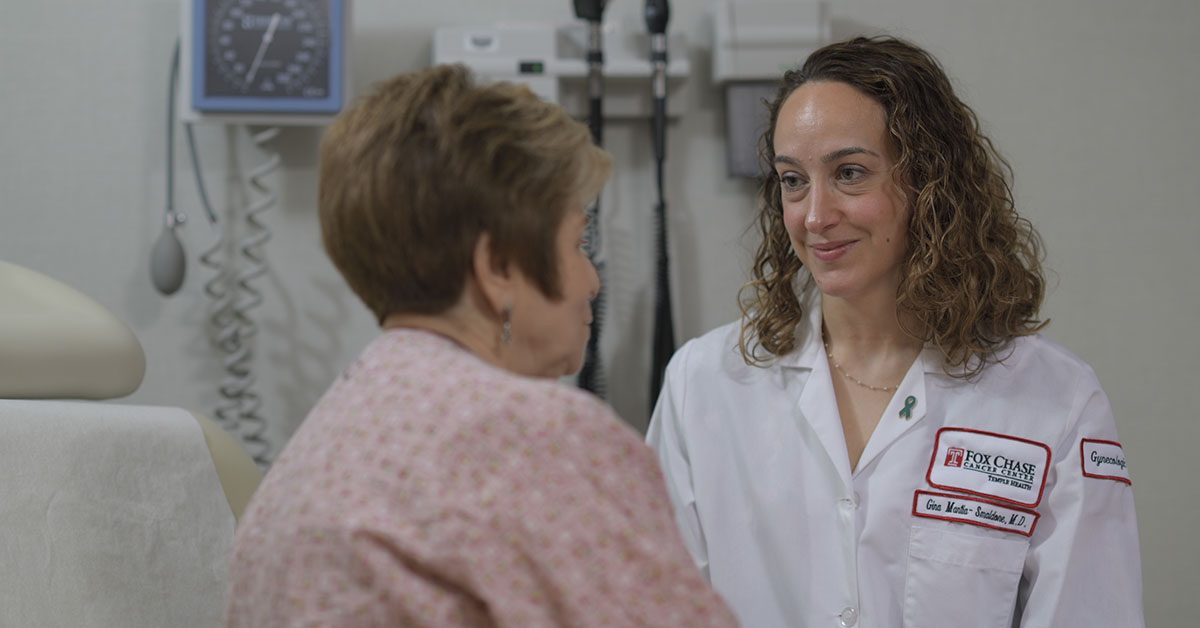Transit Alert: SEPTA is cutting bus, subway, and rail service across Philadelphia. These changes may affect patients, visitors, and staff traveling to and from Fox Chase Cancer Center locations. Read full update.
Breadcrumb
- Home
- Thrive Cancer Blog
- Keeping Ovarian Cancer from Returning: What to Know About Maintenance Therapy

Keeping Ovarian Cancer from Returning: What to Know About Maintenance Therapy
-
Being told you have ovarian cancer is overwhelming and can be particularly scary. The disease has a reputation for being extremely aggressive with low survival statistics when caught in its later stages. But that reputation is changing. Many women are living longer than ever after their diagnosis. Treatments for ovarian cancer are evolving, and something called maintenance therapy is helping to slow or stop the cancer’s return.
Here, Gina M. Mantia-Smaldone, MD, a gynecologic oncologist at Fox Chase Cancer Center, answers common questions about maintenance therapy for ovarian cancer.
What is maintenance therapy?
About 80% of women who are diagnosed with ovarian cancer will go into remission after their initial treatment, but around 60% will then have a recurrence. The goal of maintenance therapy is to delay a cancer recurrence or to reduce the risk of it recurring at all. It involves using specialized medications to maintain remission.
Maintenance therapy can usually be started right after the initial surgery and chemotherapy are complete.
“Maintenance therapy after first-line chemotherapy may be the best opportunity to improve prognosis,” Mantia-Smaldone said. “We hope that by starting these agents after the final cycle of front-line chemotherapy, we can improve prognosis beyond five years.”
What role does genetics play in prescribing maintenance therapy?
Maintenance therapy should be a part of the treatment conversation as soon as someone is diagnosed with ovarian cancer.
“With a new diagnosis, we talk about how the biggest risk factor for ovarian cancer is genetics and family history,” Mantia-Smaldone said. Many women with ovarian cancer—up to 25%—have a family history of the disease or a genetic mutation that predisposes them to getting the disease. That’s why a genetic counselor is often involved with a diagnosis. “At that time, we’ll introduce the concept of maintenance chemotherapy because women with a genetic risk factor often benefit from a treatment approach that incorporates Poly ADP-ribose polymerase (PARP) inhibitors,” Mantia-Smaldone said.
PARP inhibitors are oral chemotherapy medications. These medications stop an enzyme that’s involved in repairing damaged DNA. Blocking this enzyme can slow or stop tumor growth because it makes DNA inside cancer cells less likely to be repaired.
The BRCA1 and BRCA2 are also important in DNA repair. But a mutation of these genes, which can be inherited or acquired in a patient’s tumor, increases the risk for ovarian cancer. PARP inhibitors benefit women with these genetic mutations due to two faulty DNA repair pathways, a concept known as “synthetic lethality.”
Studies have also shown that PARP inhibitors are also effective in maintaining remission in women with ovarian cancer who don’t have BRCA mutations but whose tumors exhibit deficiency in repairing DNA damage—called a homologous recombination deficiency.
What other medications can be used in targeted maintenance therapy?
Another type of maintenance medication for women with ovarian cancer is anti-angiogenesis inhibitors. These are intravenous therapies that can block the actions of a protein called vascular endothelial growth factor (VEGF).
VEGF promotes the formation of new blood vessels, which provide a tumor with the nutrients it needs to grow and spread. The goal of anti-angiogenesis inhibitors is to stop the growth of new blood vessels, which will help “starve” a tumor. Studies have shown these drugs increase cancer’s response to treatment and delay the time it takes a cancer to return.
Anti-angiogenesis may be considered in women with their initial chemotherapy and continued to maintain remission.
Recent clinical trials have investigated the role of combining PARP and anti-angiogenesis inhibitors together for maintenance therapy. This combination may be of most benefit to those women with BRCA1 and BRCA2 mutations.
What else should women know about recurrent ovarian cancer?
“It’s always important to continue regular visits for surveillance of ovarian cancer and to be aware of the risk of a recurrence,” Mantia-Smaldone said.
“See your doctor on a regular basis—don’t skip your surveillance visits. Be vigilant with notifying your provider of concerning symptoms. If you have persistent abdominal symptoms that last seven days or longer in a month, talk to your doctor,” she said.
Learn more about ovarian cancer treatment at Fox Chase Cancer Center.
Share
-
Share with Facebook
-
Share with twitter
-
Share with email
-
Print this
